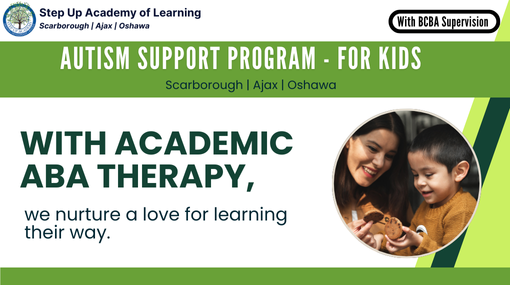SUPPORTING STUDENTS WITH AUTISM THROUGH ACADEMIC ABA THERAPY

Autism Spectrum Disorder (ASD) is a neurodevelopmental disorder that interferes with communication, interactions with other people, and experiences in the world. People with ASD can have trouble socializing and communicating and they can have repetitive behaviors or interests that are limited in number. Academic ABA therapy is an effective method used to support students with autism by helping them develop essential skills for communication, social interaction, and academic performance.
Individuals with autism may find social cues confusing or difficult to interpret, may have unusual sensitivities to sounds, may prefer to do the same thing at the same time every day, and may have difficulty talking or understanding others.
During learning at educational institutes, autistic students may have problems with changes in time, too much sensory information, social communication, and abstract thinking.
Advantages of Academic ABA Therapy for Students of Autism
Through academic ABA therapy, appropriate support is ensured to meet the learning specifics of the students with autism. Through providing personalized teaching approaches and developing supportive relationships, specialists can eventually consider autistic students to thrive academically and emotionally.
Enhanced Social Skills :
Special Education Teachers can blend social skills training into tutoring sessions, which will help students with autism to improve and practice social skills, and communication, and apply those skills in a relaxing setting. Academic ABA therapy supports this by offering structured methods for social development.
Targeted Behavioral Support:
Board Certified Behaviour Analysts develop behavior management strategies and methods to overcome problems such as emotional disorders, impulse control, and lack of attention toward tasks. This helps the child in effective self-regulation and control which is a key component in learning.
Flexibility and Adaptability:
Through Academic ABA Therapy specialists can design instruction and activities that will meet the exclusive needs and inclinations of students with autism; they can adjust the activities to fit the student’s pace, content delivered, and sensory considerations.
Transition Support:
The special education teachers can help students with autism whenever there exist changes in their goals, tasks, settings, or academic levels. Through this, they provide scaffolding and support to make these students make a smooth transition and to reduce their anxiety about or resistance to change.
Encouragement of Special Interests:
Educators can target the special interests of students by integrating them into various lessons as well as activities. Tutors do this using these interests as motivators.
Building Executive Functioning Skills:
Tutors can help students with autism develop executive functioning skills, such as organization, time management, planning, and problem-solving, through academic ABA therapy, enabling students to become more independent learners.
Empowerment Through Success
Specialists can help students acknowledge their progress and make learning fun while they develop a sense of achievement and motivation to persist and improve.
Strategies Academic ABA Therapy for Students with ASD
In teaching students with autism, the key is to create a structured and predictable environment, use visual aids, do sensory activities, and hone communication skills as well as set realistic goals. Academic ABA therapy provides a framework for applying these strategies effectively.
Using a protected and regular learning environment may guarantee students with autism are secure and enable concentration on learning.
Visual aids including charts, schedules, and diagrams are important in helping students with autism enhance understanding and communication. Other activities such as sensory activities may also be used to moderate the sensory stimulus and encourage concentration.
Utilization of clear communication and setting realizable goals.
The Contribution of the Parents and Teachers in Aiding Children with Autism
Parental, teacher, and tutor collaboration are the key components of an effective educational support system for autism and address children’s learning and emotional needs simultaneously.
Partnering with educators to develop an effective support network
By working closely with tutors, parents, and educators can harmonize the educational methods, share valuable notes, and offer non-stop support, which is essential for students with autism to achieve their academic goals and have a better life.
By giving ongoing feedback and keeping tabs on results.
Students with autism can be monitored through feedback from tutors, parents, and educators to pinpoint their progress, and areas for development, and provide them with the necessary interventions for their growth and development. This process is enhanced with the use of academic ABA therapy.
Applying accurate strategies both at home and at school is recommended.
Consistent teaching methods, positively reinforced skills, and cross-communication among the home and school environments lead to an effective, consistent, and empowering learning experience for students with autism.
Step Up Academy of Learning is Here to Help
Scarborough | Ajax | Oshawa — Personalized Learning, Your Way.


